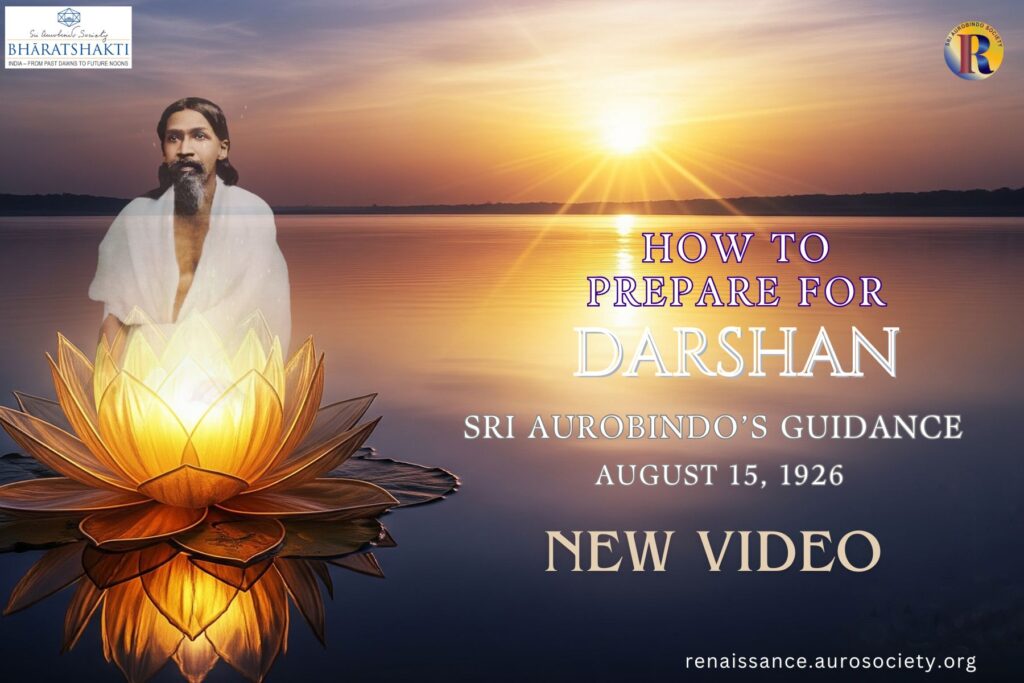Volume II, Issue 4
Author: Nirodbaran
Continued from PART 1
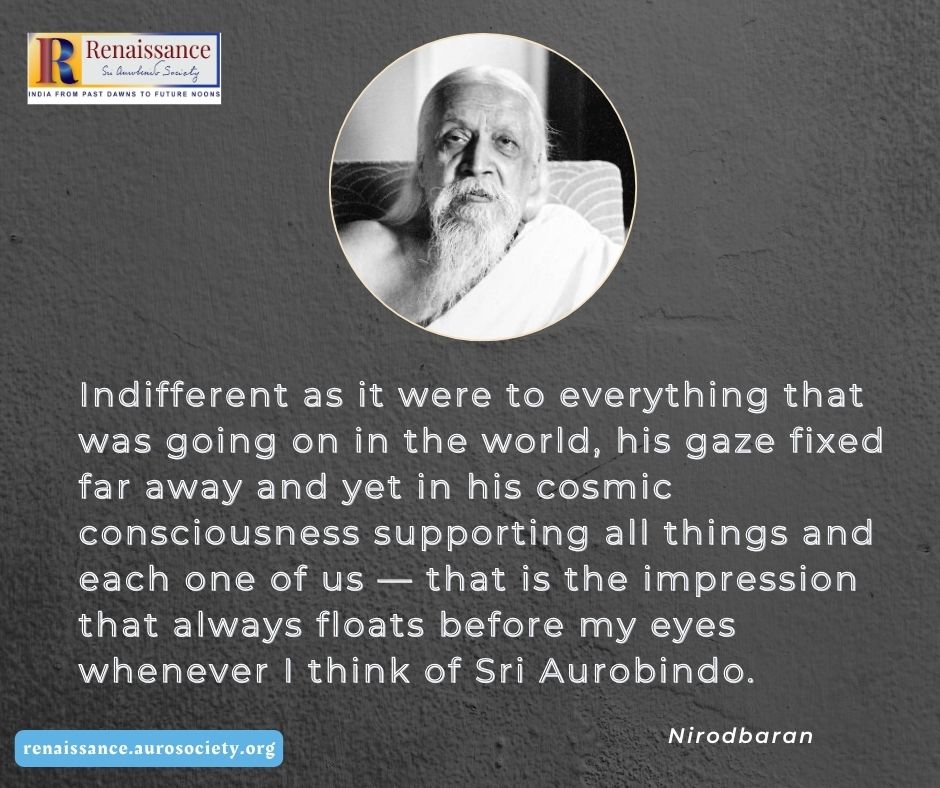
Let us come now to our own period in Pondicherry. The early years of Pondicherry life when he was living with his young comrades, sharing the same food, even sharing the same towel are common knowledge. In 1930 or so, the period of correspondence began. Those of you who have gone through these volumes of letters must have noticed with what sublime patience and indulgence he has again and again written about the same subjects, to so many people in different ways, without the least annoyance or displeasure. You’ll be very much amused to hear what kind of questions some people used to ask. I’ve heard that someone asked:
“When I walk, shall I put my left foot first or my right foot? When I put sugar in the milk shall I stir it this way or that way?”
And Sri Aurobindo answered them calmly and quietly, in a serious manner. Of course, I had my share too, of such foolishness as you know very well. He had given me the great privilege to ask him whatever I liked. I have attacked his Yoga, I have called him inconsistent with impunity! But calmly and affably, and in a very indulgent tone, he has borne all. Those who have read the correspondence will be able to confirm this.
Then we come to the routine which he gave me when once I told him that he had plenty of time to concentrate. He wrote:
“From 4 p.m.-6.30 p.m. afternoon correspondence, newspapers. Evening correspondence 7.30-9.00 p.m., 9.10 p.m. concentration, 12-2.30 a.m. bath, meal, rest. 2.30-5 or 6 correspondence, unless I am lucky.”
Once he wrote:
“Correspondence suspended, resumable on notice. But under cover of your medical cloak you can carry on, only mum about it. Otherwise people might get ideas and give you a headache.”
I quote another letter in which he sweetly admonishes me to become gentle with the patients. He writes:
“Well, I don’t know why, but you have the reputation of being a fierce and firebrand doctor who considers it a sin for a patient to have an illness. You may be right but tradition demands that a doctor should be soft like butter, soothing like treacle, sweet like sugar and jolly like jam.”
Throughout the correspondence this was the tone. Though my correspondence was specially seasoned with humour, with all people he was always gentle, very patient.
Now about the Darshans. Some people used to grumble — myself one of them — saying: “You are so grand, aloof, austere, we are afraid of coming to you.” He replied to me:
“O rubbish! I am austere and grand, grim and stern! every blasted thing that I never was! I groan in an un-Aurobindian despair when I hear such things.”
After the correspondence period, personally, we had the privilege to serve him when he was confined to bed due to an accident. One day after my duty I had gone to have my rest; suddenly the person on duty came and said, “Sri Aurobindo is calling you, something has gone wrong.”
Much perturbed, I ran upstairs, but as I came near, he said: “Oh, it is nothing much.” He was so apologetic in his tone as if he had put me to great inconvenience by an untimely call. Then, pointing to his right thigh, he said, “There has been some pain here for sometime, can you do anything?”
Sri Aurobindo was not a person to call somebody because of a slight pain. It must have been very acute and he must have been suffering badly for a long time. But it was just like him to say: “Oh, it is nothing!” and offer me an apology! Fortunately by some adjustment the discomfort was set right.
Now a second instance. Dr. Manilal, who was our chief, advised that we should give Sri Aurobindo some massage. He had departed for Gujarat, leaving me in charge. The time that could suit Sri Aurobindo and us was a very odd one — 4 o’clock or so in the early morning. Two or three of us began to massage — the lower part of the leg particularly; he suffered the torture. After a few days he called me and asked:
“Is this massage necessary? You see, these early hours of the morning are the only time when I have some sleep. Unless it is absolutely necessary, can it be postponed or stopped?”
I said: “Certainly we can stop it.” That was his manner.
During the massage we used to talk a lot and ask him many questions. One typical answer of his was “Perhaps”! To three out of four questions he replied: “Perhaps”. Then one of us asked:
“Why do you answer by saying ‘perhaps’ ? Can’t you give a definite answer?”
He said:
“When the Supramental will descend, I’ll give a definite answer.”
One day, the Mother brought the report of a sadhaka flying into a temper and belabouring somebody, and it was not the first or the second occasion. So the Mother said to Sri Aurobindo:
“I ask for your sanction” (in the French sense).
He heard her quietly and said:
“Let him be given a final warning.”
We knew that there would be many final warnings.
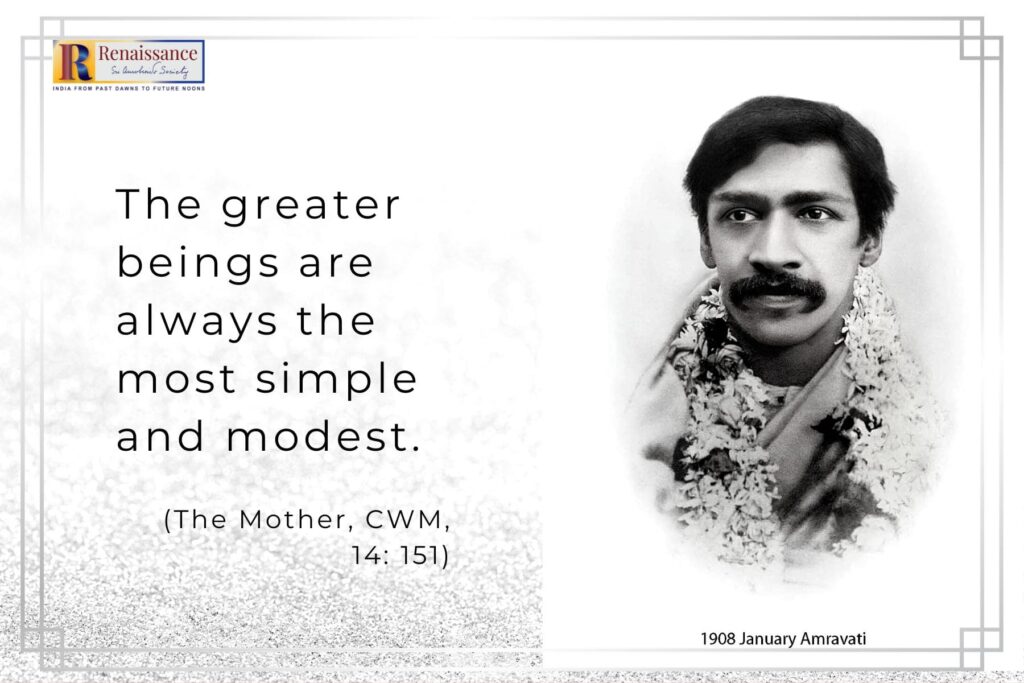
ALSO SEE: Humility, Nobility and Aryan Character
Again, when he was writing The Life Divine, sitting on the bed, there was no ceiling fan at that time, just a table fan 2 or 3 metres away. As you know, the Pondicherry current is both weak and unreliable; the fan was just like the waft of a tiny bird’s wings.
But he lived in another consciousness: whether there was a fan or not did not matter to him in the least. He was writing and writing quite absorbed. When the writing was over we saw his whole dhoti soaked and his bedsheet underneath drenched with perspiration: he was sitting, almost literally, in a small pool of water! No complaint in the least.
Then sometimes even that fan would stop, thanks to the whim of the Pondicherry electricity, but he would not ask to be cooled by a hand-fan. One of us on duty would fan him, and he would accept it, but would never ask for it.
And whenever he needed anything, he would look this way, that way, to see if the attendant was free or engaged. After being sure that he was free, he would say: “Could I have this? Could I have that?” — always in a mild and detached tone. I may mention that he could be even quite impersonal.
Purani records in the early period a typical instance of Sri Aurobindo’s nature. Somewhere, on the terrace perhaps, they were all waiting. Sri Aurobindo came out of his room with a telegram in his hand and, looking at nobody, said: “I suppose this telegram has to be sent.” This was his way with us too.
Those of you who have read the Talks must be thinking that we always had a familiar relation with him. In fact there was for at least half the day an impersonal attitude on his part towards everything, a notable distance which yet had nothing of an aloof “superiority”.
Another instance. He was lying in bed, the ceiling fan had been installed. It was revolving at great speed. My colleague Satyendra was on duty; he felt Sri Aurobindo wanted something; he went and asked: “Sir, are you looking for something?”
“Oh, no… Is Nirod there?”
“No, Sir, he is not there.”
Sri Aurobindo would not say anything further, but Satyendra pressed: “Can I do anything?”
“I was thinking if the speed of the fan could be reduced.”
“I can do it, Sir.”
“Oh, can you?”
Well, he inquired for me because at the very beginning, as are the Mother’s ways, she had given me the charge of the fan and of some other things. Sri Aurobindo wouldn’t violate that rule!
Again, he went without a real direct bath for quite a long time because there was no convenience to give it to one who had had a fracture. He had to be satisfied — well, that is our human way of putting it, for satisfaction or dissatisfaction did not apply to him in the least and it was we who were satisfied or dissatisfied — with only a sponge bath for some years, until the new bathroom was made. His long hair went unwashed for quite a time. He didn’t mind at all. Not that he was indifferent to bathing or was trying to imitate Louis XIV who had only two baths in his life, ‘ one when he was born and the other when he died — so goes the story.
It was not that at all (you have noticed in my earlier statement that he used to take his bath at 2.30 a.m. daily), but his principle of life, as all of us are aware, was that he would not initiate anything; he left himself, entrusted himself, completely to the Divine or to the Mother. He knew very well that whatever had to be done would be done at the right time. He had no worry, he had no concern.
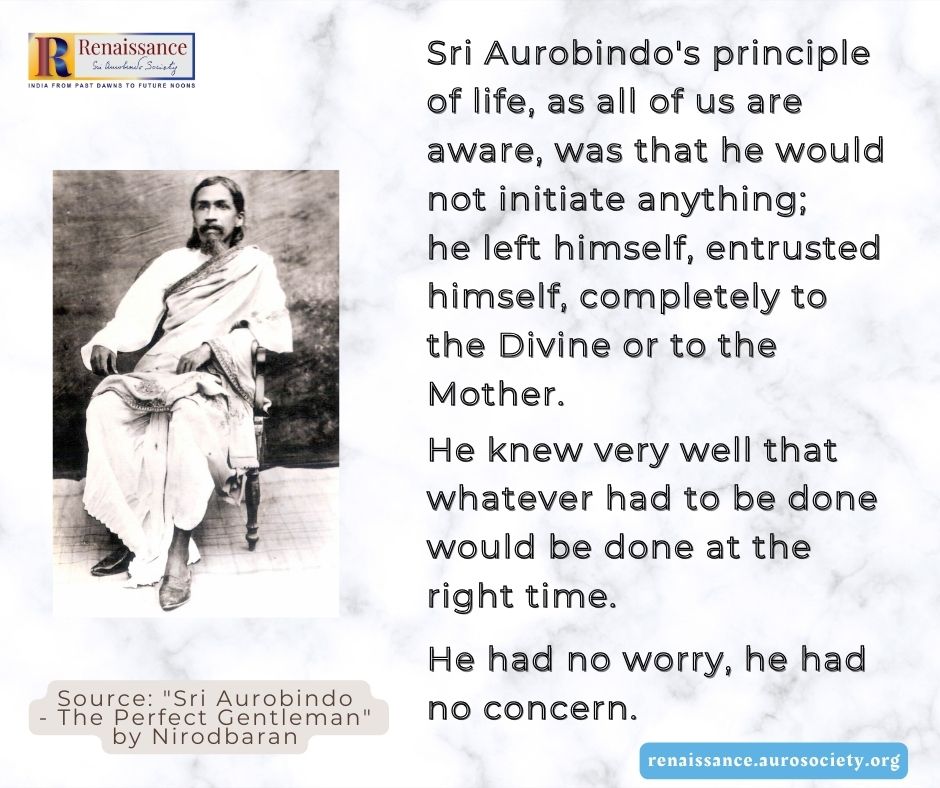
Once a colleague of ours, very much impressed by Sri Aurobindo’s look, tried to make a plaster-cast, with the aid of a so-called sculptor from outside. He took great pride in it, and began to show it to a select few. The Mother came to know of this and didn’t like the idea at all; she went and reported to Sri Aurobindo such and such a thing was being done. That he should be asked to hand over the cast at once.
There you see the Mother is not a gentleman, She can be Mahakali. Sri Aurobindo said: “All right, I’ll speak to him.” When the disciple came up, he called him, and in a very quiet and affectionate manner explained to him the impropriety of his action.
Again, another sadhak — I am not complaining against sadhaks, I am only trying to bring out what I have proposed to do: Sri Aurobindo’s natural character — another sadhak used to write letters critical of some actions of the Mother. Sri Aurobindo tolerated them once, twice, thrice, answering his points, but when it became a little too much he said to me, a bit vexed perhaps — “Why does he write like that about the Mother?” That was all.
One thing that Sri Aurobindo didn’t like was that the Mother should be criticised, and one thing that the Mother doesn’t like is that Sri Aurobindo should be criticised! But when he answered — I know because at that time he used to dictate letters to me — the tone betrayed nothing of the irritation or vexation — all he sent was very calm and quiet reasoned argument.
And to this same sadhak, when once he was finding it very difficult to stay here and wanted to leave the Ashram, Sri Aurobindo wrote back — the sadhak told me himself — “I beg of you, I pray to you.” Sri Aurobindo saying this to a disciple, however cherished he might be — what humility! It reminds me of Sri Krishna, who, it seems, washed the feet of the Brahmins in some sacrifice. So there you have Sri Aurobindo.
About his food we saw that his lunch started being at 10 o’clock and gradually shifted to 3 or 4. He waited patiently — perhaps I shouldn’t use this adverb, it is too ordinary — he just waited without a word till the Mother would be free from her work and bring the food. Only on a single occasion, later on, after 1945 or so, we heard him saying: “I am terribly hungry.” Not that he was taking anything in between — except at times a simple glass of water.
He was very much concerned that the Mother should not be, in any way, tied to his convenience or comfort. His whole programme was made in such a way as to suit that of the Mother. He gave us an injunction — perhaps it is not the right word — that the Mother should not be kept waiting in any case. We must keep things ready. Because, as you know, from early morning till late midnight, every moment is precious for the Mother; so he didn’t want her time to be wasted.
I shall finish by giving one instance more — from our Talks. The War was on, Hitler was in the ascendant. Sri Aurobindo and the Mother declared that Hitler represented a hostile force and so we must all side with the Allies who were on the side of the Divine. But still many in India and Europe were much enchanted by Hitler and wanted him to win.
Even in our camp, knowing very well that Sri Aurobindo and the Mother were supporting the Allies, some had the temerity to wish for Hitlers victory. Of course the root cause was not that they loved Hitler but that they did not love the Britishers, India’s rulers. So when Sri Aurobindo heard about it, he told us:
“It seems it is not five or six of our people but more than half that are in sympathy with Hitler, and want him to win. It is a very serious matter. The Government can dissolve the Ashram at any moment. The whole of Pondicherry is against us. Only because Governor Bonvin is friendly to us, they can’t do anything….
If these people want that the Ashram should be dissolved, they can come and tell me, and I will dissolve it instead of the police doing it. They have no idea about the world, and talk like children. Hitlerism is the greatest menace that the world has ever met.”
Mark the tone. From what depth of sorrow Sri Aurobindo must have said this! He could easily have sent away all these ignorant and harmful people. Now, if I have been able by all these instances to prove to you that Sri Aurobindo was a perfect gentleman, I’ll be satisfied. If you demur to the common appellation “gentleman”, let us call him a Supramental perfect gentleman. But the one impression he has left with us is that he was Shiva himself. He had a magnanimity such as the verse in Savitri suggests:
A magnanimity as of sea or sky
Enveloped with its greatness all that came (p. 15)
Indifferent as it were to everything that was going on in the world, his gaze fixed far away and yet in his cosmic consciousness supporting all things and each one of us — that is the impression that always floats before my eyes whenever I think of Sri Aurobindo.
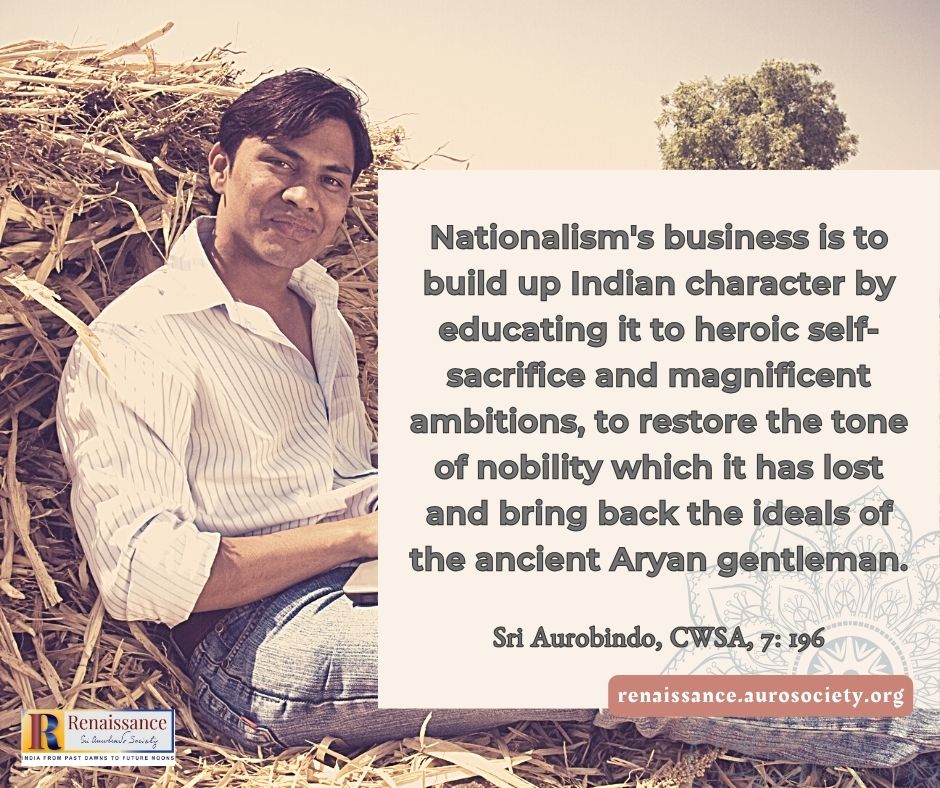
Have you read PART 1?
Don’t miss our exhibit:
Egoism and Its Forms: Becoming Conscious with Guidance from Sri Aurobindo
~ Graphic Design: Beloo Mehra


